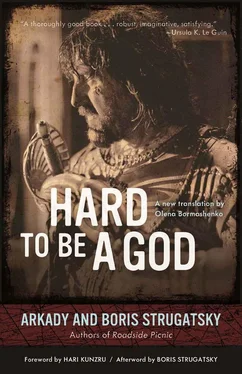Rumata gave a deep sigh. After the miraculous helicopter rescue, Arata had insisted on an explanation. Rumata tried to explain about himself; he even pointed out Earth’s sun in the night sky—a tiny, barely visible star. But the rebel only understood one thing: the damned priests were right and there were gods living behind the firmament who were all-good and all-powerful. And since then, he steered each of his conversations with Rumata to one thing: God, since you exist, give me your power, for it is the best thing that you can do.
And each time Rumata kept quiet or changed the subject.
“Don Rumata,” the rebel asked, “why don’t you want to help us?”
“Wait a minute,” Rumata said. “I beg your pardon, but I would like to know how you got into the house.”
“That doesn’t matter. No one but me knows the way. Don’t try to evade the question, Don Rumata. Why don’t you want to give us your power?”
“Let’s not talk about it.”
“No, we will talk about it. I didn’t summon you. I’ve never prayed to anyone. You came to me yourself. Or did you just decide to have some fun?”
It’s hard to be a god, thought Rumata. He said patiently, “You wouldn’t understand. I tried to explain to you twenty times that I’m not a god—you never believe me. And you wouldn’t believe me if I told you why I can’t help you with weapons.”
“You have lightning?”
“I can’t give you lightning.”
“I’ve already heard that twenty times,” said Arata. “Now I want to know: why?”
“I repeat, you wouldn’t understand.”
“Try me”.
“What do you plan to do with the lightning?”
“I will incinerate every single one of the gilded bastards like bugs, destroying their whole damn race until the twelfth generation. I’ll wipe their fortresses off the face of the earth. I’ll incinerate their armies and all who defend and support them. You don’t need to worry—your lightning will only be used for good, and when only the freed slaves are left on the earth and peace reigns, I will give you back your lightning and never ask you for it again.”
Arata stopped, breathing heavily. His face had turned dark from the rush of blood. He probably already saw the duchies and kingdoms engulfed in flames, and the piles of charred bodies amongst the ruins, and the huge armies of victors, ecstatically roaring, “Freedom! Freedom!”
“No,” said Rumata, “I will not give you lightning. It would be a mistake. Try to believe me. I can see further than you.” Arata was listening, his head sunk on his chest. Rumata clenched his hand. “I will only give you one reason. It pales in comparison with the primary reason, but you will actually understand it. You are very good at surviving, worthy Arata, but you too are mortal; and if you die, if the lightning passes into other hands that are not as pure as yours, then I shudder to even think of the consequences.”
They were silent for a long time. Then Rumata got a pitcher of Estorian wine and some food from the cellar and put it in front of his guest. Arata, without lifting his eyes, started to break the bread and drink the wine. Rumata felt a strange sense of painful ambivalence. He knew that he was right, yet in some strange way, this rightness lowered him before Arata. Arata was clearly somehow superior to him—and not only to him but to all those who had come to this planet uninvited and who, full of helpless pity, watched the tumultuous bustling of its life from the rarefied heights of dry hypotheses and alien morality. And for the first time Rumata thought, There is no gain without a loss. We’re infinitely stronger than Arata in our kingdom of good and infinitely weaker than Arata in his kingdom of evil.
“You shouldn’t have come down from the sky,” Arata said suddenly. “Go back to where you came from. You’re only doing us harm.”
“That’s not so,” Rumata said gently. “At any rate, we do not harm anyone.”
“No, you do. You inspire groundless hopes.”
“In whom?”
“In me. You have weakened my will, Don Rumata. I used to only rely on myself, and now you’ve made me feel your power behind me. I used to lead every battle as if it were my last. And now I’ve noticed that I save myself for other battles, which will be decisive because you will stand beside me. Leave this place, Don Rumata. Go back to the sky and never come back. Either give us your lightning, or at least your iron bird, or even simply draw your swords and lead us.”
Arata stopped talking and reached for the bread again. Rumata kept looking at his fingers, which no longer had any nails. The nails had been torn out with a special device two years ago by Don Reba himself. You still don’t know everything, thought Rumata. You still believe that you are the only one doomed to be defeated. You still don’t know how hopeless your cause itself is. You still don’t know that the enemy isn’t so much outside your soldiers as within them. You might still overthrow the Order—the wave of peasant rebellion will throw you onto the throne of Arkanar, you will level the castles of the noblemen, you’ll drown the barons in the Strait, and the insurgents will honor you as the great liberator. And you will be kind and wise—the only kind and wise person in your kingdom. And along the way, you will begin to give away land to your associates, and what will your associates do with land without serfs? And the wheel will start spinning the other direction. And you’ll be lucky if you manage to pass away before the new counts and barons emerge out of yesterday’s loyal fighters. That has already happened, my worthy Arata, both on Earth and on this planet.
“No response?” asked Arata. He pushed his plate away and swept the crumbs off the table with the sleeve of his cassock. “Once I had a friend,” he said. “You’ve probably heard of him—Waga the Wheel. We had begun together. Then he became a bandit, the king of the night. I didn’t forgive him for his treason, and he knew it. He had helped me a lot—out of fear and self-interest—but he never did want to come back. He had his own goals. Two years ago his people gave me up to Don Reba.” He looked at his fingers and curled them into a fist. “And today I found him in the Port of Arkanar. In our business, there’s no such thing as half a friend. Half a friend—that’s always half an enemy.” He got up and pulled the hood over his eyes. “Is the gold in its usual place, Don Rumata?”
“Yes,” Rumata said slowly, “it’s in its usual place.”
“Then I will go. Thank you, Don Rumata.”
He silently walked through the study and disappeared through the door. The bolt clanged softly in the entrance hall below.
Here’s one more thing to worry about, thought Rumata. How in the world did he get into the house?
The Drunken Lair was relatively clean. The floor was carefully swept, the table was scrubbed to whiteness, and there were bundles of forest grass and twigs in the corner for fragrance. Father Cabani was primly sitting on a bench in the corner, sober and quiet, his clean hands folded in his lap. As they waited for Budach to fall asleep, they talked about nothing in particular. Budach, sitting at the table next to Rumata, listened to the mindless chatter of the noble dons with a benevolent smile and from time to time would give a start, dozing off. His hollow cheeks were burning from a vast dose of tetraluminal that had been discreetly mixed into his drink. The old man was very excited and was having trouble falling asleep. The impatient Don Gug was bending and unbending a camel shoe underneath the table, managing, however, to keep an expression of cheerful ease on his face. Rumata was crumbling bread and watching with tired interest as Don Condor slowly filled with bile: the Keeper of the Great Seals was nervous, because he was late for the emergency night session of the Conference of the Twelve Merchants dedicated to the revolution in Arkanar, at which he was supposed to preside.
Читать дальше












